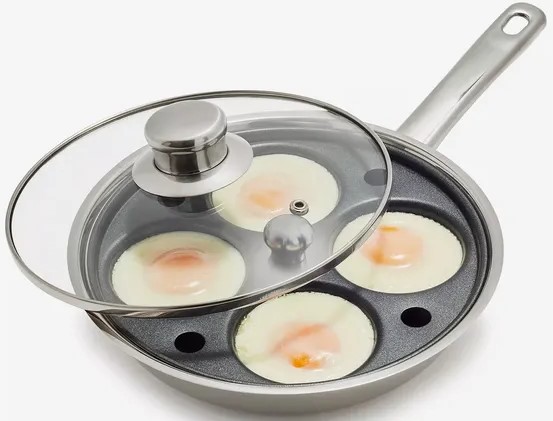On Redundant and Neglected Objects

Comedian Richard Herring (who we interviewed way back in Issue 10) is moving house. Packing up his kitchen stuff, he writes in his blog that
it’s weird to touch every single thing that you have in your kitchen in one weekend. And realise that for many things it’s the first time you’ve touched them since you’ve bought them.
As a regular reader of his blog, I know that Rich prides himself on a certain material efficiency. He’s keen on recycling, for example, and on getting every last drop of utility out of single-use carrier bags. And yet…
I rarely if ever have poached eggs at home, but for some reason had at least five devices designed to give you the perfect poached egg that I HAVE NEVER TRIED OUT! Well I did have. Now they’re in a box to go to charity for someone else to buy, put in a drawer and NEVER USE.
Those egg poachers will probably survive way longer than anyone who is alive today and yet never fulfil their purpose of poaching an egg. I don’t know whether to feel sad for them or happy. Is that a life well lived or a waste of existence[?]
I firmly believe it’s a waste of existence. Imagine being one of life’s understudies and never getting to step into the spotlight.
It’s something that bothers me, actually. If I have anything redundant in my home (let alone five of them), I feel sad about it. I want everything in my home to be used. No one thing should be neglected.
Part of my feeling this way comes from my theory that waste happens at the point of origin, not at the moment of disposal. The waste occurs when the raw materials are torn irreplaceably from the earth. If we never mined or extracted oil again and had a completely circular economy, there would be no more waste. Every egg poacher in the world would be either used or stripped for its materials to make something that can be used.
Too much emphasis in eco-guidance falls into the categories of reuse and recycling: not enough people call for reduction. Reuse and recycling theoretically delay more waste from happening, but only a reduction in objects being produced will really solve our problems. And if we want to reduce the number of objects in the world, the first objects to be eliminated should be the redundant ones.
or should I stop giving inanimate objects the power of thought and emotion[?]
It’s called Kami in Japan, the idea that everything has a soul, even inanimate objects. Even if that’s not “real,” it’s useful to keep in mind when deciding if something is living up to its potential or not. It’s perfectly possible for an object to “experience” neglect, exclusion or redundancy.
Oddly enough, the most redundant items in my home are also egg-related: two eggcups. They’re of a groovy mid-century design and taken from my grandparents’ kitchen along with some other bits and bobs when they died. I don’t eat boiled eggs very often so they don’t really get used enough. They’re on the chopping block of minimalism really, but I like them. So I’d better start eating boiled eggs.
*
New Escapologist Issue 16 is available in both print and digital formats.




I love our egg poacher. When the little cups got too scratched or lost and the insert that holds them got cracked in a move, we turned to white ramekins that just sit inside the pot, directly in the water. It’s great because you can even use a large-sized ramekin that makes a poached egg to exactly the size of a Montreal bagel.
I suppose my piece of equipment that I should lose is the omelette pan. I have since married a man who can make omelettes in a regular pan (I cannot) and so it could probably be passed on in a Buy Nothing group.
I also have two egg cups from the 50s in my house. We never eat boiled eggs so I use them to start plant cuttings: they maintain their use and look lovely on a windowsill.
“exactly the size of a Montreal bagel” – now you’ve got my attention!
Hi again Tucker. I enjoyed your latest Post Morbus very much. Leacock etc are all within my wheelhouse, but thanks especially for putting me on to Boiler House Books and the Recovered Books Project. Excellent stuff.